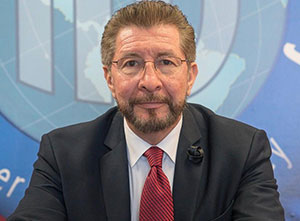War on narcoterrorism: the paradigm that is changing geopolitics

By: Carlos Sánchez Berzaín - 17/11/2025
Share:
Narcoterrorism is “terrorism linked to and financed by drug trafficking,” and in the 21st century, it is the most brutal form of aggression against the peoples of the Americas. Narcoterrorism has seized control of countries in Cuba, Venezuela, Nicaragua, and Bolivia, and of states or territories within Mexico, Colombia, and Argentina, wielding power and supplanting politics. In this crisis, the United States has established the war on narcoterrorism as a cornerstone of its foreign policy, a paradigm shift that is changing the geopolitics of the region and the world.
Narcoterrorism, which in the last century described the alliance between drug trafficking and insurgent or guerrilla groups such as the FARC, the ELN, and the M-19 in Colombia, Shining Path and the MRTA in Peru, and others, has evolved in the 21st century to encompass the seizure of political power and the control of national and local governments. With Hugo Chávez's rescue of Fidel Castro's dictatorship in Cuba in 1999, narcoterrorism was organized to maintain power indefinitely in Cuba and Venezuela and to expand its reach using the Cuban model.
Drug trafficking is a source of funding for the Cuban dictatorship, which in the 1980s established itself as the first narco-state in the Americas through the alliance between the Castro regime and drug traffickers Pablo Escobar of Colombia and Roberto Suarez of Bolivia. In the 21st century, drug trafficking is a fundamental source of state terrorism used to sustain dictatorships and the ongoing aggression against democracies.
Geopolitics studies "how political sovereignty develops over geographic space and international relations concerning territorial occupation, its limits, borders and resources."
The “war on drugs” was a paradigm starting with President Richard Nixon in 1971; President Ronald Reagan “centralized and systematized the attack on the entire drug chain from producers to distributors and users, beginning to attack the problem at its source”; the United States foreign policy became an inter-American policy of war on drugs at the First Summit of the Americas in 1994 with important results.
“Plan Colombia” was the last success of the war on drugs, but objective reality proves that “the fight against drug trafficking fails when drug traffickers take power,” and this is what happened with the empowerment of so-called 21st-century socialism—a political figurehead of narcoterrorism—which, expanding on Cuba, installed narco-states in Venezuela with Chávez and Maduro, Ecuador with Correa, Bolivia with Morales and Arce, and Nicaragua with Ortega and Murillo.
Narcoterrorism acquired the status of a “subject of international law” with the control of governments that in turn controlled Latin America, its moment of greatest power being the recognition that President Barack Obama gave to the head of narcoterrorism, dictator Raúl Castro, at the Summit of the Americas in Panama in April 2015.
The expansion of narcoterrorism also occurred with influence on elections and control of governments in democratic countries through the financing and support of candidates such as the Kirchners in Argentina, Lugo in Paraguay, Humala in Peru, López Obrador and Sheinbaum in Mexico, Petro in Colombia, Lula in Brazil, Castro in Honduras, and more, authors of the "wave of legitimization and attempted legalization of narcoterrorism" under the narrative of the supposed failure of the fight against drug trafficking, the pacification of terrorism and the legalization of drugs.
Illegal coca cultivation and cocaine production have increased in Colombia, Peru, and Bolivia. Venezuela has become a cocaine hub with the Cartel of the Suns operating under the guise of the Bolivarian Revolution, and fentanyl has been added to the mix, with Mexico and China contributing to attacks against the US and the region. In addition to their narco-terrorist control of Cuba, Venezuela, Bolivia, and Nicaragua, they control territories in Mexico through cartels that dominate entire states, in Colombia through the FARC and the ELN, and in Argentina, where press reports and studies indicate controlled provinces or even drug trafficking hubs.
The search for the command centers of narcoterrorism leads to the dictatorships of Cuba and Venezuela and their satellites of Nicaragua and Bolivia, which in addition to being narco-states exercise internal terrorism or "state terrorism", and where international terrorism is trained, promoted, exported and protected.
These findings have created the new paradigm of the “war on narcoterrorism,” in which the US is carrying out “Operation Southern Spear” as a “mission to defend our homeland, expel narco-terrorists from our hemisphere, and protect our homeland from the drugs that are killing our people. The Western Hemisphere is the US neighborhood, and we will protect it.” The US has called on the democracies of the Americas to unite through “financial sanctions, security assistance, the use of surveillance technologies, and the dismantling of money laundering.”
Geopolitics is changing and signaling the end of narco-terrorist dictatorships.
*Lawyer and Political Scientist. Director of the Interamerican Institute for Democracy
«The opinions published herein are the sole responsibility of its author».